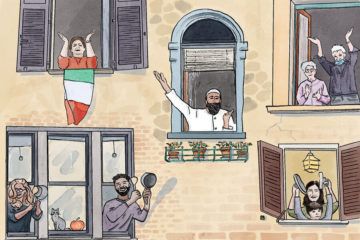Michael Hopkins in Christian Science Monitor:
 Truth is, this year has seen plenty of gratitude, instinctively and generously expressed. The people applauding out their windows for emergency responders, the heart signs, the food deliveries to essential workers, the neighborhood trash teams, the looking-in on elders. Online platforms as purpose-built as gratefulness.org and as customarily combative as Twitter have been flooded with counted blessings: for our loved ones, for the Amazon carrier, for our dogs. People gave thanks for simple things, mostly – their families, video chats, the “tall green trees that are older than me,” a hummingbird, the ocean, soup. (“Yep, soup,” says a West Sacramento, California, man.) But many, many other expressions of gratitude took the form of generosity, of trying to give back or pay it forward. The news was filled with stories of people in grocery lines paying for the customer coming next, donations to farmworkers, businesses furnishing free meals to front-line responders.
Truth is, this year has seen plenty of gratitude, instinctively and generously expressed. The people applauding out their windows for emergency responders, the heart signs, the food deliveries to essential workers, the neighborhood trash teams, the looking-in on elders. Online platforms as purpose-built as gratefulness.org and as customarily combative as Twitter have been flooded with counted blessings: for our loved ones, for the Amazon carrier, for our dogs. People gave thanks for simple things, mostly – their families, video chats, the “tall green trees that are older than me,” a hummingbird, the ocean, soup. (“Yep, soup,” says a West Sacramento, California, man.) But many, many other expressions of gratitude took the form of generosity, of trying to give back or pay it forward. The news was filled with stories of people in grocery lines paying for the customer coming next, donations to farmworkers, businesses furnishing free meals to front-line responders.
…So it has always been, this idea of hardship as a whetstone for which thanks are due. It’s easy to forget that the official Thanksgiving holiday we know today did not even exist until Abraham Lincoln created it during that hardest of national hardships, the Civil War. On Oct. 3, 1863 – just weeks before he would go to Gettysburg to give his famous address – he issued a proclamation that thanks “should be solemnly, reverently and gratefully acknowledged as with one heart and one voice by the whole American People,” and that it should be done on the last Thursday of each November. The proclamation didn’t quail from noting that the country was, indeed, “in the midst of a civil war of unequaled magnitude and severity.” And it humbly suggested that any prayers offered up might particularly “commend to His tender care all those who have become widows, orphans, mourners or sufferers.” Nevertheless, the president observed, it still was a time of peace overseas, of bounty in the fields and mines, of lawfulness in the villages.
According to Arthur Brooks, who teaches a course on happiness at Harvard Business School, “Psychologists have found that many of the most meaningful experiences in life are quite painful.”
More here.
